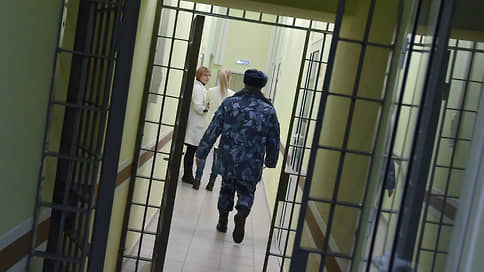Prison medicine will be diagnosed
[ad_1]

Minister of Justice Konstantin Chuichenko announced that the department would conduct an “audit” of the medical care of convicts in Russian colonies. The need is caused by disappointing, according to the minister, statistics from the Federal Penitentiary Service (FSIN): although the number of prisoners in places of deprivation of liberty is declining, “mortality remains at the same level.” Mr. Chuichenko did not give figures, the Federal Penitentiary Service has not published them for three years, however, it is known that in 2019 2,420 people died in the colonies. Eva Merkacheva, a member of the Presidential Human Rights Council (HRC), points out that prisoners most often die from heart disease, and a critical level of stress leads to an exacerbation of other diseases.
“Despite the decrease in the number of special contingents, mortality (in places of deprivation of liberty.— “b”) remains at the same level,” said Konstantin Chuichenko at the annual board of the department in his speech, devoted, among other things, to the development of the penitentiary system (penal system). “Here it is necessary to analyze the causes, revise medical support and seek to improve performance. We must remember that these are not just numbers, but human lives.” The Minister did not provide mortality statistics. Kommersant did not find this information in open sources and reports of the Federal Penitentiary Service. The department promptly failed to explain how many prisoners died in Russian colonies in 2021 and 2022.
In 2020, the Federal Penitentiary Service, however, published this figure: in 2019, 2,420 prisoners died (five cases – as a result of murders committed on the territory of correctional institutions). That year, according to the Federal Penitentiary Service, more than 524,000 people were serving their sentences in the colonies of the Russian Federation, respectively, then almost every 200th prisoner died.
As Kommersant reported, by January 2021, the number of prisoners in the penitentiary system had decreased to 482 thousand people, by January 2022 – to 465 thousand, by January 2023 – to 433 thousand. Mortality data, however, no longer sounded . However, RIA Novosti, citing data from the Federal Penitentiary Service, indicated that in 2020 the number of deaths in the penal system (that is, both in colonies and in pre-trial detention centers) amounted to over 500 cases per 100 thousand people. At the same time, the agency named the most common causes of death in places of detention for 2019-2020: 3,889 people died due to diseases, 16 – as a result of murders, 561 people committed suicide and 376 more fell into the category of “other” deaths.
The largest number of deaths is associated with chronic diseases of the heart and cardiovascular system, Eva Merkacheva, a member of the HRC, said in an interview with Kommersant. This, in turn, directly depends on “poor medical care,” she emphasizes: “People in pre-trial detention centers and colonies are under constant stress, their illnesses are getting worse. I know several cases when a person was engaged in business or simply worked, led an ordinary peaceful life, but in the colony he had a heart attack or stroke. There is no prevention, and people are in cramped conditions and worry not only for themselves, but also for their loved ones.” She also sees a problem in the poor nutrition of prisoners, which directly depends on “very low wages” in those institutions where prisoners can find work. “They need to earn money and be able to eat normally,” the expert explains. “When I checked the colonies, people honestly told me that they buy mayonnaise and loaves, because this way you can feel full faster and this will not require large expenses. Last but not least, in terms of the health of prisoners, attention should be paid to sports grounds on the territory of the colonies so that people can lead a more active lifestyle.”
It should be noted that in 2019, the “Rus Sitting” Foundation (included in the register of foreign agents), with grant support from the EECA Operational Assistance Fund for Key Populations, studied the situation of prisoners with HIV, tuberculosis, syphilis and other infectious diseases in Russian penitentiary institutions within the framework of the “Risk Group” project . Human rights activists cited data from the Federal Penitentiary Service, according to which, from 2014 to 2017, 32% of deaths in places of detention were due to HIV infection. At the same time, the authors of the study note that 7% of all people living with HIV in Russia are kept in prisons. Human rights activists, having studied the cases of prisoners with HIV and tuberculosis, said that the administration of pre-trial detention centers and colonies does not use the opportunity to release them from punishment in cases where it is necessary: Commission often hides the true diagnosis of the convict. In this regard, the participants of the Risk Group project called for the removal of medical units from the administration of the colony or pre-trial detention center and forbidding the placement of seriously ill prisoners in the ShIZO.
[ad_2]
Source link








